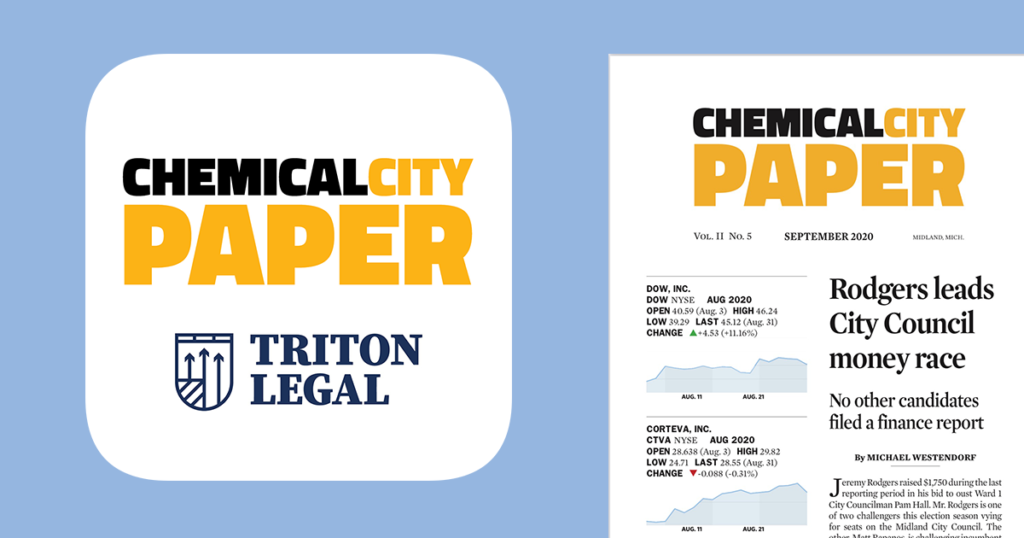
The Future of Nonprofit News in Midland
First and foremost, the City Paper is deeply appreciative of the support our donors and sponsors have provided, even during this challenging time for the entire community. Thank you. We do not take your support for granted.
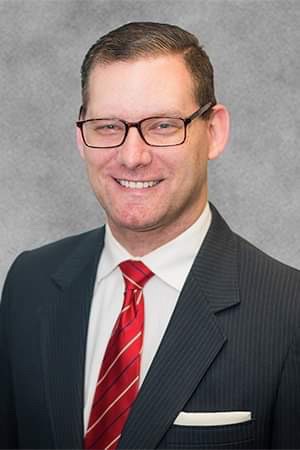
Yesterday, I finally signed the City Paper’s Application for Recognition of Exemption Under Section 501(c)(3) of the Internal Revenue Code. Obtaining tax-exempt status is the holy grail for most nonprofit organizations, and, if granted, it will allow us to solicit much-needed grants in order to fulfill our mission, participate in local, nonprofit initiatives, and for our supporters: retroactively transform your donations into tax-deductible contributions.
The application is a behemoth, and the I.R.S. is notorious for being strict with this document. It includes all of our financial information, conflicts of interest, business plan, and more. The average time frame for approval once an application is filed is 8-9 months. We retained the local law firm
Poznak Dyer Kanar Schefsky Thompson PLC for the filing, and we’re very appreciate of their guidance, counsel, and support. Once approved, in the same spirit and manner we treat all of our important documents and financial information, we will make the entire application, which clocks in at over 50 pages, available to the public.
Since our launch, even though the City Paper is a Michigan Domestic Nonprofit Corporation, we have operated at the federal level as a for-profit corporation. Essentially, we have all of the obligations of a corporation and enjoy none of the benefits of a nonprofit. Yesterday’s application seeks to change that. We chose to launch and operate before filing because we know that our mission is critical to the health of the community, and we knew of the complexities and long time-frame involved in the application process.
We have made tremendous progress in making our community aware of the differences between a community-owned nonprofit news organization dedicated to fulfilling a mission and for-profit, conglomerate-owned organizations primarily dedicated to shareholders.
Even around the country, as our rare, mission-first model begins to replicate and spread, nonprofit news organizations are beginning to change the media landscape for the better. ProPublica, another nonprofit news organization, won the 2020 Pulitzer Prize for Public Service, journalism’s most prestigious honor, along with the Anchorage Daily News, for a “riveting series that revealed a third of Alaska’s villages had no police protection, took authorities to task for decades of neglect, and spurred an influx of money and legislative changes.”
The Salt Lake Tribune, the largest newspaper in Utah, actually transformed from a traditional for-profit media entity into a nonprofit news organization, creating a model (as well as inspiration) for other news organizations to follow. Nonprofit news organizations are the future of news as well as the solution to the decades-long decline and bleeding of traditional, for-profit media entities. Mega-mergers, buyouts, furloughs, position consolidations, new payment schemes, and cutting costs all the way to the bottom can only last so long. The drive to chase the almighty dollar at the expense of a decline in the quality of local journalism takes its toll.
This isn’t to say that the reporters and editors at our local, for-profit news sources care more about shareholder value than they do about high-quality journalism. In fact, it’s probably the opposite, they are our neighbors and community members. However: the higher you climb the ladder, the more those priorities flip, and at the top brass level, it’s all about shareholder value.
When things are going well, the difference between a for-profit and a nonprofit news organizations is negligible. But when things aren’t going well… that’s when citizens and readers begin to see the true difference between those sets of priorities. No well-meaning local editor of a for-profit, conglomerate-owned newspaper will have any say over New York or San Francisco during tough times. Media consolidation leads to a loss of local control, and readers want important decisions about their local news sources made on Main Street, not Wall Street.
Local control and the nonprofit model, however, do come with enormous challenges. And we remain committed to facing those challenges head-on. Even with our limited resources, we continue to control the local news narrative. You are seeing more and more local news stories — not just from us — on the things we believe readers care about: in-depth local coverage of people and policies in government, education, business and the arts.
Since its launch, the City Paper has built key relationships and has grown into a niche publication favored by engaged citizens as Midland’s authoritative source on area public policy issues. Earlier this year, we led the community conversation on the tragic and ongoing opioid epidemic in Midland. In a full print edition Special Report, we interviewed dozens of victim families, and learned and shared their stories; and talked to medical and public policy officials about what needs to happen to make an impact toward a solution. In May, after the historic flood of the Tittabawassee River and the failure of the Edenville and Sanford dams, we published another full print edition (as well as an online feature) Special Report entitled ‘We’ve lost everything.’
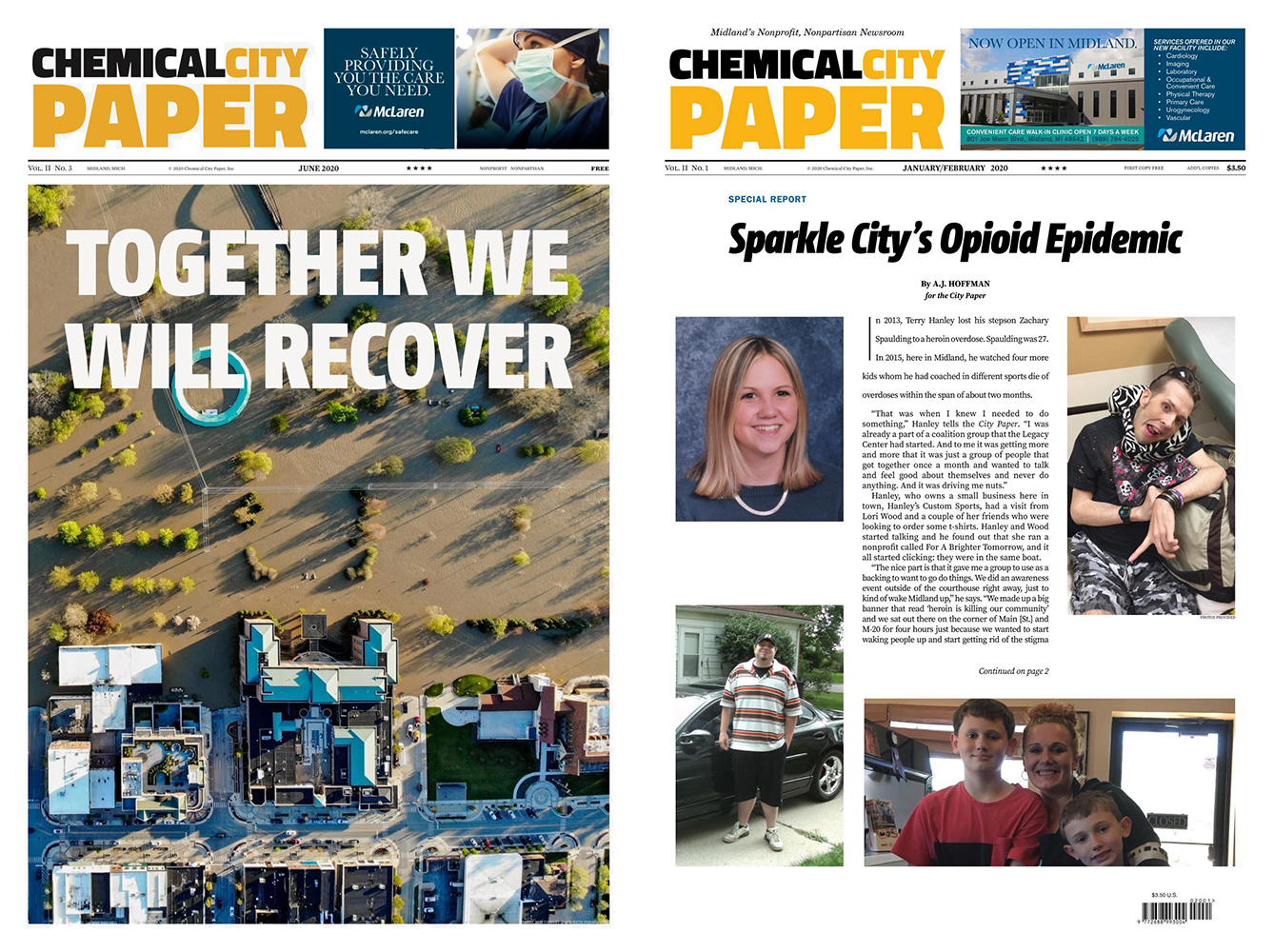
COVID-19, just like with many other organizations, threw a wrench into City Paper operations earlier this year. Starting in March, the City Paper stopped conducting in-person meetings, and the staff started working from home. Our board of directors did not meet from January to July during the pandemic, canceling two meetings. We also briefly paused the production and delivery of our print edition in order to facilitate social distancing and due to the closures of most of our newsstand locations, continuing to deliver our news report on our mobile, Web, and social media platforms.
As far as news coverage, we have striven to cover the pandemic in a responsible manner. For us, that means breaking news on things such as the first confirmed case in Midland, but staying away from horse race and fear-driven daily updates on confirmed cases or deaths. As always, our news report is driven by the people and policies which impact our community most, carefully balanced by our current resources.
In January, we partnered with M.B.A. students from Northwood University’s DeVos Graduate School of Management on strategy and market analysis. The class, “MBA 654 Competitive Strategy & Marketing Practicum,” was taught by Dr. Matthew O’Connor (who also served on the City Paper’s board of directors).
Students selected various local companies and organizations to partner with on marketing and strategy and the City Paper was honored to be one of the selected organizations. From the program’s flyer: “Your business receives valuable research through the project, and student consultants reinforce their understanding of business fundamentals while applying cutting-edge management practices to strategic and marketing issues and opportunities.”
The four talented graduate students who worked with us — Christian Barry, Mark Thomas, Marissa Dudek, and Brenden Campbell — submitted their final report and recommendations for the City Paper earlier this year. The document is a detailed examination of the City Paper’s current practices, proposed processes, market research survey results, detailed recommendations, and more. The City Paper remains deeply appreciative of the partnership with Northwood and for the students’ steadfast dedication and hard work.
The market research that our Northwood University partners conducted revealed some interesting thoughts from our readers. The City Paper is fiercely nonpartisan. But I’ve often said, the folks usually most concerned about how partisan we are tend to be the most partisan themselves. Some of our reader comments did not disappoint.
“High quality slightly leaning Democratic,” said one reader, followed by another comment: “Alternative to Midland Daily News, but with a bend to the right.”
I suppose if the left thinks you’re right and the right thinks you’re left, you’re doing just fine.
Along with filing our application for tax-exemption, the City Paper also adopted a new Conflict of Interest Policy to ensure we adhere to the highest ethical standards when it comes to nonprofit organizations. To that end, each Director will sign an annual Disclosure of Financial Interests, which the City Paper will make public. We are committed to remaining the most transparent, ethical, and accountable media organization in the area. We’ve also reduced the number of our Directors to seven to increase our nimbleness and better reflect our current size. At our annual meeting this year, we welcomed A.J. Hoffman to our Board of Directors. Mr. Hoffman is the co-host of the Small Market Podcast, a local podcast on sports. He graduated from Central Michigan University with a degree in journalism.
Our staff also used some of the added ‘down-time’ during the peak months of the pandemic to work on new strategies for the City Paper which will guide us in our work toward improving the community. We focused on four major areas: increasing and diversifying our readership, focusing on how to best serve and recognize our donors, placing an emphasis on technology, and growing our operating revenue ambitiously. Part of that plan, on the editorial side, is to place more emphasis on what we believe to be the long-term future of news in general: mobile and audio platforms.
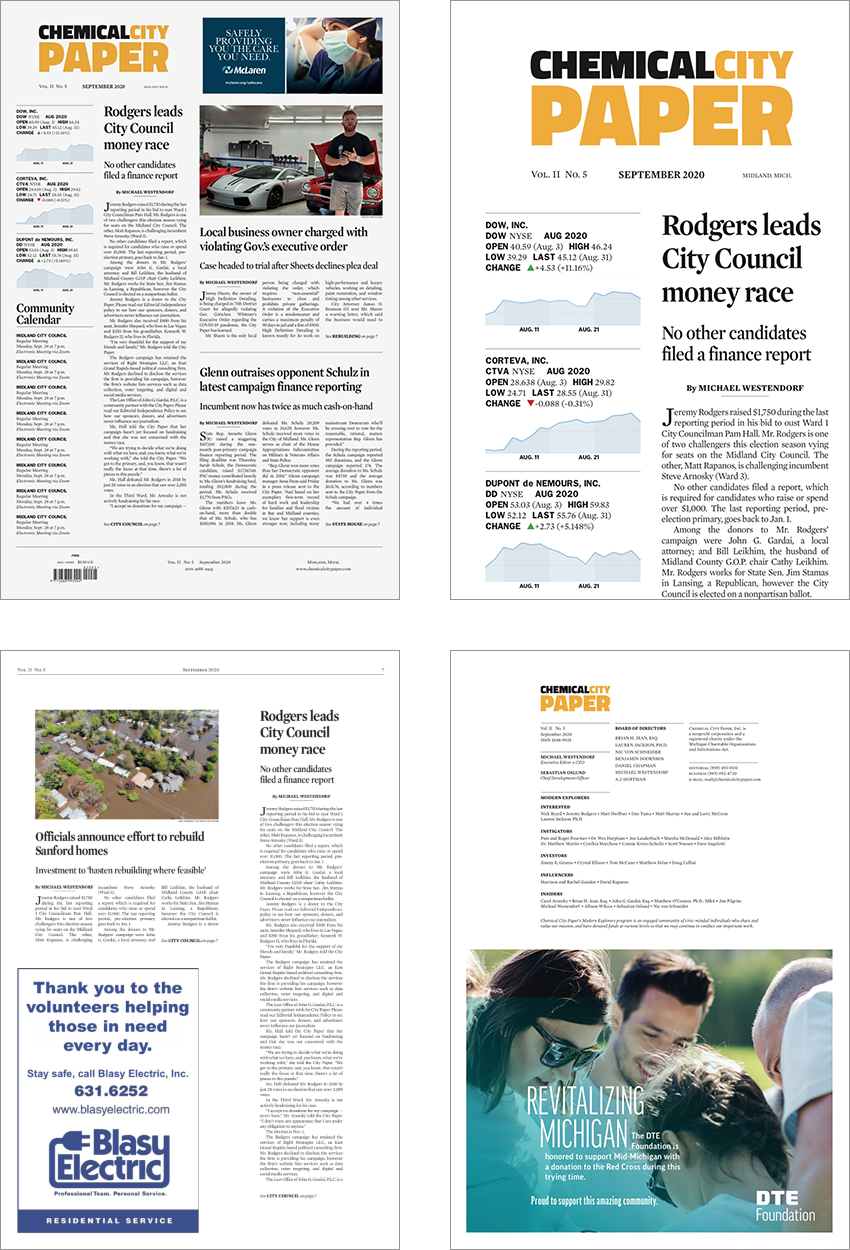
We have also redesigned our print edition, which is a monthly digest of the news found on our other media platforms. We tailored the new print edition toward the reader base and audience which, over the last year or so, we’ve developed with our journalism. That audience is engaged in our community, influential, well-educated and affluent. While it’s tempting to think of the City Paper solely through our print newspaper, we have to do a better job of emphasizing that our print edition is just one way we deliver our journalism and fulfill our mission.
Most of the world is still stuck in a print-centric line-of-thinking when it comes to news organizations. Introductions to the City Paper are often met with questions such as ‘So are you a weekly?’ or ‘What’s your circulation?’ Those are print-centric ways of thinking of our organization, which instead should be thought of as a public charity first, and a news organization which uses all forms of media — audio, mobile and Web, and yes, print — in order to fulfill our mission.
We will soon be releasing our 2019 financials and tax filings. As I’m sure you know, the City Paper is deeply committed to transparency. We believe our readers deserve to know who gives us money. We fulfill this obligation with our Donor Wall — in print and on the Web — which also allows our donors to take pride in helping to make our community a better place. I am very proud to announce that, in 2019, 100 percent of dollars from donors and sponsors were used on mission-fulfilling activities. CharityWatch, a noted charity watchdog, rates nonprofits that spend at least 75 percent of their income on mission work as efficient. Our unique model includes a diversified revenue stream so that our administrative and overhead costs are covered by our advertising revenue.

Finally, one of the most important aspects of our editorial strategy is to embrace and adapt the technologies which enable us to tell our stories more effectively. We must reject that Luddite apprehensions and juvenoia that doomed the Old Media dinosaurs when it comes to new media platforms and opportunities. We are extremely excited to announce that the City Paper will have a mobile app — for both Apple and Android devices — which we aim to have available for our readers in the coming days. The apps will allow our users and readers to read the City Paper, but most importantly, they will give our readers the chance to receive news alerts on the areas of coverage most important to them: local government, education, business, or the arts.
Triton Legal PLC, a criminal defense law firm based in Bay City, stepped up to help sponsor our new mobile app. Their support helped significantly to defray the cost of developing, testing, building, and submitting our apps. We are very grateful for their support and we’re proud that they are a Community Partner with the City Paper.
The City Paper should produce journalism so compelling and valuable to readers that they’re inspired to support us financially. Only 30 people do today. We believe this is the ultimate measure of an engaged audience, so we must focus our efforts on moving more readers from their initial experience with our organization and our journalism into experiences that bring them closer to a Modern Explorers membership.
Please know that even a small donation of $10 helps us tremendously. You can make a difference and help to improve your community today. Please consider donating to the City Paper if you can afford it. |
|
We look to other successful nonprofit news organizations, such as The Texas Tribune, Voice of OC and Voice of San Diego, and even N.P.R. We don’t seek to replicate their models, mostly because that would be inappropriate considering the size of the news market here in Midland, however we do seek to use their ideas and even their language in a scaled-down, tailored fashion designed to serve our community.
As we get used to a more socially distant world, we are also implementing a plan to consistently publish more content. During the peak of the pandemic, we decided to use our limited resources on developing the tools which will allow us to fulfill our mission more effectively. Now that we’re at the end stages of those plans, it’s time to devote more of our resources toward our journalism. We aim to do that by making smarter choices about what we cover and when we cover it, establishing more writing opportunities for community members, and trying to establish sponsor-led explanatory and investigative reporting that draws in readers and serves our community. And we will seek deeper connections with our donors and readers, pursuing the market penetration already seen by the Daily News, and by way of enhanced editorial coverage, new media partnerships and live events, once the world returns back to ‘normal.’
Michael Westendorf is Executive Editor & CEO of Chemical City Paper.
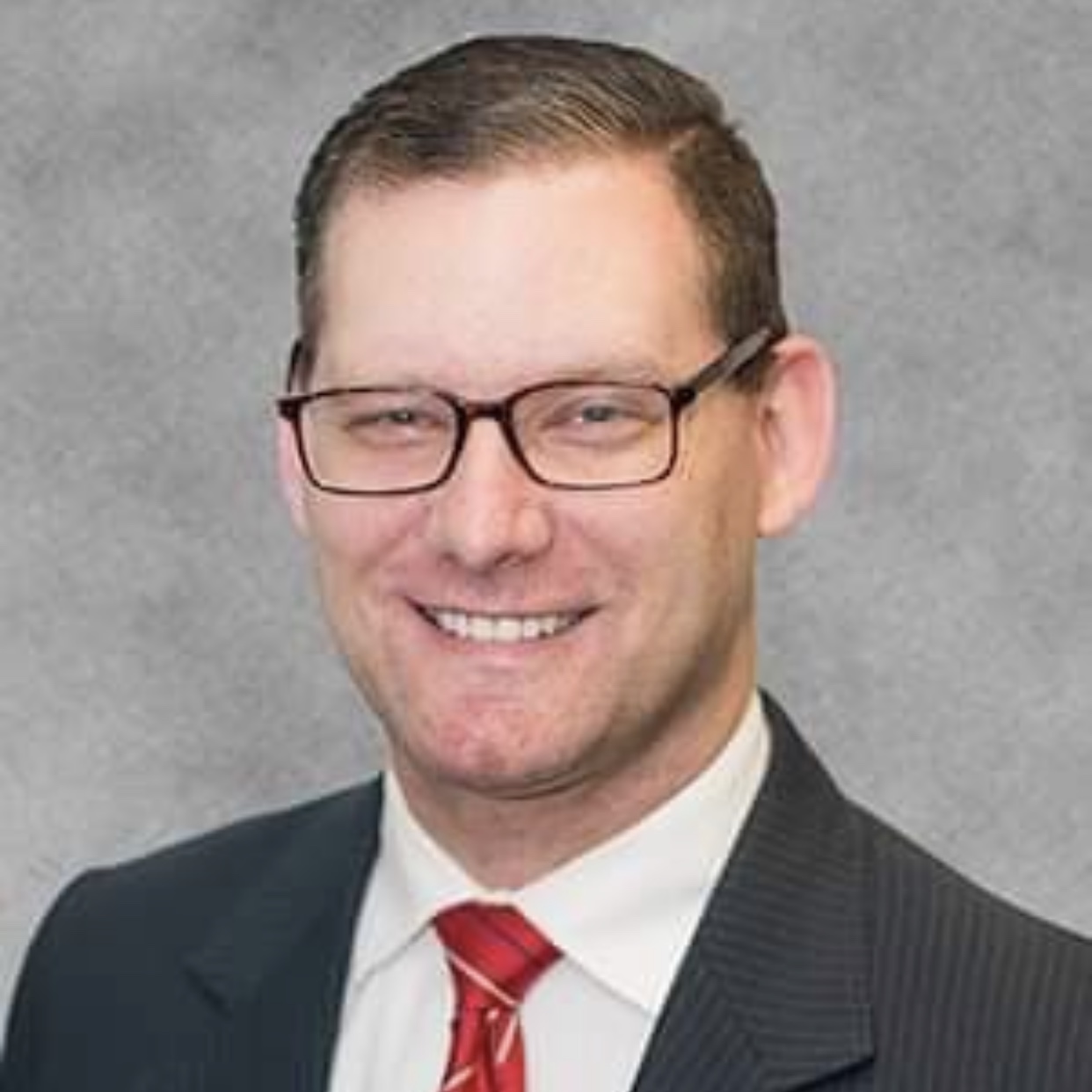
Michael Westendorf is the chairman and executive editor of Chemical City Paper. As Executive Editor, he leads the City Paper’s news coverage and editorial team.

